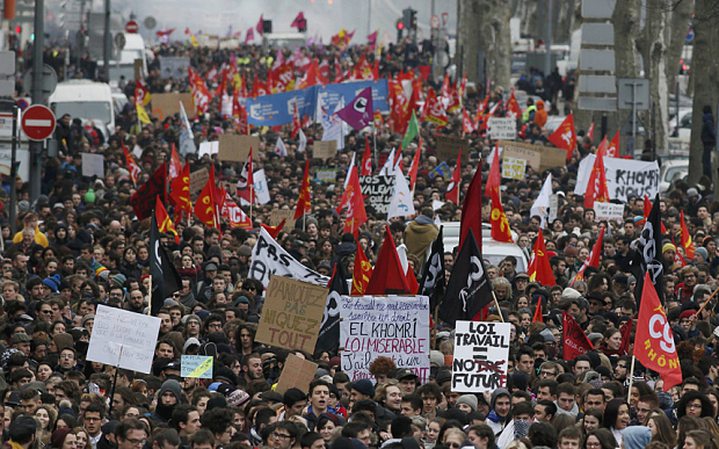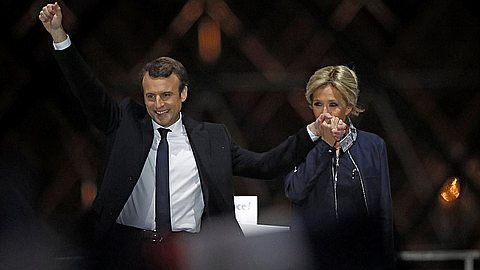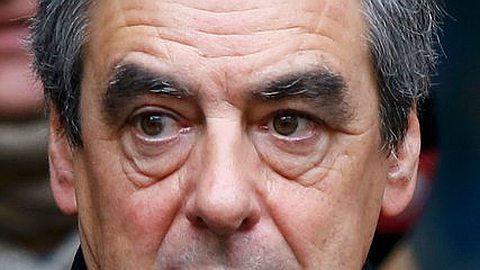Hollande Fears French Student Revolution in Protests Against Labour Reform

French media have speculated that the president's Socialist government could struggle if protests morph into a repeat of the 2006 demonstrations against a youth job scheme that saw the-then Right-wing government scrap the planned law in panic.
"You have to be very careful with youth protests," Mr Hollande is cited as fretting in Le Canard Enchainé, the investigative weekly. "You never know how things might pan out."
Unions claimed that half a million people took to the streets around the country, while the government put the figure at quarter of a million. Protests were mainly peaceful, although there were skirmishes with police in the southeastern city of Lyon.
More than a million people have signed a petition against the proposed bill, which would loosen France's notoriously rigid labour laws to make it easier to fire employees, also capping the amount companies have to pay out in working tribunal disputes.
The proposed law also cuts overtime pay for work beyond 35 hours – the working week famously introduced in the 1990s in an earlier Socialist bid to boost employment. In some sectors, young apprentices could work 40 hours a week.
Currently, the government argues, bosses are too afraid to take new staff for anything other than temporary contracts, meaning France is split between those with quasi-jobs for life and those with a near total lack of job security. The stalemate, it says, is fuelling the unemployment rate, currently at the record level of 10.2 per cent overall and around 18 per cent for under 26-year-olds.
Unions argue that capping labour dispute payouts will only lead to more job losses.
While a few months ago, a large majority of French said they were all for labour law reform, some 70 per cent now say they oppose it. Half of the French said they sympathised with protesters.
Jean-Claude Mailly, head of the leftist Force Ouvrière union, said that this was just "the first day of mobilisation" and that another protest date, March 31, was already planned.
While these unions want the law scrapped, the more moderate unions, including the CFDT, want to see "deep changes" and are staging separate protests on March 12.
Pierre Martinez, head of the Medef employers' union, warned that scrapping the bill would be "dramatic for the country".
By a quirk of the calendar, unions at France's national rail operator, SNCF, and Paris' public transport network, RATP, staged their own strike to demand pay increases. Only one in three national TGV trains were running, while suburban RER were heavily affected. The Metro had an almost normal service while eight out of 10 Eurostars were running.
Above all, Mr Hollande fears the reaction of French students, whose sometimes explosive response to reforms is notoriously hard to predict and has terrified successive governments since the student demonstrations of May 1968.
William Martinet, head of Unef, France's main students' union, said the reform "betrays youth". Several Parisian secondary schools were blocked by protesting students on Wednesday with around 100 affected around the country.
Speaking on the eve of the protests, Mr Hollande insisted that his intent was "to enable young people to have more job stability".
But he is facing serious opposition from a sizeable leftist flank among the Socialists, including Martine Aubry, mayor of Lille and architect of the 35-hour working week, who called for the law to be "totally re-written".
"If this project goes through, I think it will unfortunately have splintered the Left," warned Benjamin Lucas, head of the Young Socialists Movement.
Opposition figures predict Mr Hollande will drastically water down the proposals in the face of protests. "At best, the mountain will give birth to a mouse as François Hollande's usual balancing act will take precedence over bravery," remarked Nicolas Sarkozy, the ex-French president and head of the centre-Right party, Les Républicains.
The reform is also a test of the reformist credentials of Emmanuel Macron, France's popular and ebullient economy minister, who was reportedly behind its most controversial measures.
The government has delayed presenting the bill until March 24.




